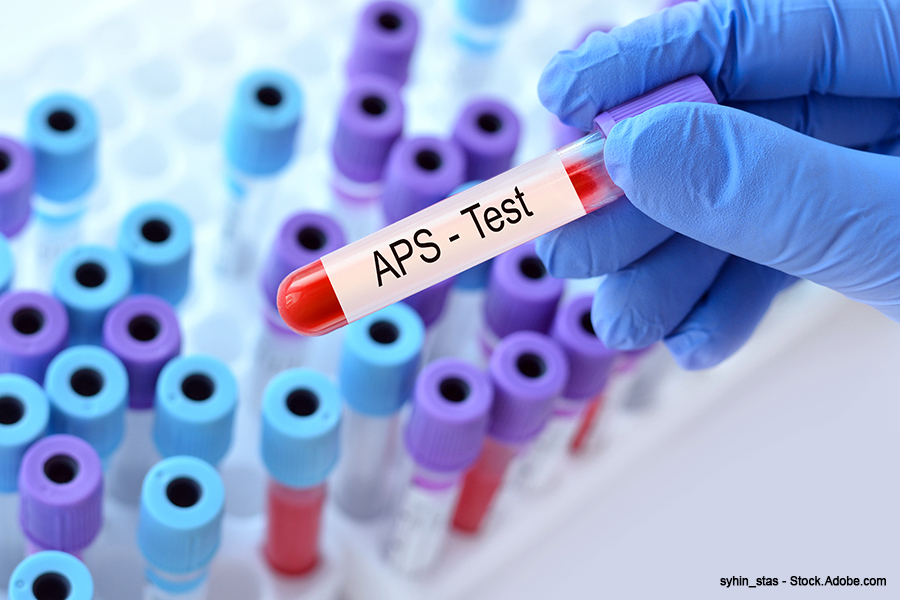
Keeping abreast of updates in anticoagulation guidelines is important for physicians to provide optimal patient care. Multiple changes to recommendations for anticoagulation have been made in the last few years, and this session provided vital updates to existing practice. This session addressed the use of anticoagulants in antiphospholipid syndrome, the use of anticoagulants in patients with obesity, bariatric surgery, chronic kidney disease (CKD) or hemodialysis, and new changes to the de-escalation of antiplatelets in patients on oral anticoagulants. It also addressed off-label dosing for direct oral anticoagulants (DOACs) in practice and new associations with mortality.
Antiphospholipid syndrome is an uncommon but serious condition that is addressed in the hospital, usually in the context of thrombotic disease. Four randomized trials (rivaroxaban in anti-phospholipid syndrome, or RAPS, trial on rivaroxaban in anti-phospholipid syndrome, or TRAPS, Ordi-Ros’s trial, and Apixaban for the secondary prevention of thrombosis among patients with antiphospholipid syndrome, or ASTRO-APS) revealed a higher risk of arterial thrombotic events, especially strokes, in patients using DOACs, making the vitamin K antagonist (VKA) warfarin the agent of choice in this disease (with a goal INR of 2.5). The speaker also suggested not testing for lupus anticoagulant during anticoagulation but agreed with testing for anticardiolipin and beta2-glycoprotein I antibodies even during anticoagulation.
Obesity and body mass index (BMI) have been relative contraindications for the use of DOACs in the past, but recent evidence has led to the International Society on Thrombosis and Haemostasis suggesting the use of standard doses of rivaroxaban or apixaban as appropriate options for treatment of venous thromboembolism (VTE) and atrial fibrillation (AF) regardless of high BMI or weight. Notably, the evidence for such a practice is more robust for rivaroxaban than for apixaban. Bariatric surgery has been another relative contraindication for the use of DOACs, and the the International Society on Thrombosis and Haemostasis has suggested not using DOACs for the treatment and prevention of VTE in the acute setting after bariatric surgery and to use parenteral anticoagulation instead for the first four weeks. Using DOACs and VKA might be reasonable after this time, but DOAC trough levels are suggested to check for drug absorption and bioavailability if DOACs are chosen.
Hemodialysis patients have been another area of evolving practice in the anticoagulation world. The 2022 RENAL-AF trial suggested that the use of apixaban was non-inferior to warfarin as it pertains to bleeding events in atrial fibrillation. Other observational data of 30,000 patients with advanced CKD also showed the likely safety of apixaban for VTE treatment. The presenter mentioned the high rate of bleeding events in all CKD and end-stage renal disease patients with either treatment and hence the consideration of higher thresholds for treatment when considering anticoagulation for AF and prolonged VTE treatment.
Low molecular weight heparin (LMWH) and unfractionated heparin (UFH) were compared for their efficacy in treating acute VTE. A Cochrane review in 2019 reiterated that LMWH has a benefit for recurrent VTE, major hemorrhaging, and mortality over UFH, which led to the European Society of Cardiology recommending the use of LMWH over UFH for acute VTE unless there is hemodynamic instability and the possibility for primary reperfusion treatment. UFH could also be considered for serious renal impairment and severe obesity.
Some of the most important updates included the de-escalation of antiplatelet agents even after acute coronary syndrome and percutaneous coronary intervention (PCI) in cardiac patients who need oral anticoagulation for an indication. A 2020 American College of Cardiology expert consensus for patients with AF or VTE and coronary interventions recommended antiplatelet treatment be continued for one year post-PCI with the use of anticoagulation therapy alone after that. Triple therapy is rarely needed, and if dual therapy is needed, P2Y12 inhibitor therapy is preferred over aspirin. This is hopefully something that percolates into practice soon. A lower proportion of patients will need to be on an antiplatelet agent if an oral anticoagulant is already being used. This change was recommended after the AF and ischemic events with rivaroxaban in patients with stable coronary artery disease, or AFIRE, trial in 2019 revealed lower all-cause mortality of rivaroxaban compared to dual therapy in patients with AF and stable coronary disease.
The talk concluded by discussing multiple systematic reviews of off-label DOACs in atrial fibrillation and the use of an inappropriately low dose being associated with an increase in mortality without a sizeable decrease in bleeding. This evidence suggests that using an inappropriately low dose of a DOAC in patients is likely not the right answer for most patients with AF.
Key Takeaways
- VKA is the preferred therapy for patients with thrombotic antiphospholipid syndrome.
- DOACs are acceptable for patients regardless of their weight and BMI. Using VKA is preferred to DOAC for use in patients after bariatric surgery, but DOAC trough levels should be checked if used.
- The use of apixaban in patients with CKD and or hemodialysis is acceptable.
- LMWH is recommended over UFH for acute VTE treatment unless there is hemodynamic instability and need for primary reperfusion treatment, severe obesity, and severe renal impairment.
- Most antiplatelet agents can be stopped safely one year after acute coronary syndrome and PCI in patients who need anticoagulation.
- Off-label underdosing of DOACs in patients with AF has been associated with increased mortality and is thus not recommended.
 Dr. Mehta is an academic hospitalist and medical director, an assistant professor of medicine and clinical core faculty with the internal medicine residency, and has roles in quality improvement, program evaluation and improvement, and medical education at the University of Cincinnati.
Dr. Mehta is an academic hospitalist and medical director, an assistant professor of medicine and clinical core faculty with the internal medicine residency, and has roles in quality improvement, program evaluation and improvement, and medical education at the University of Cincinnati.